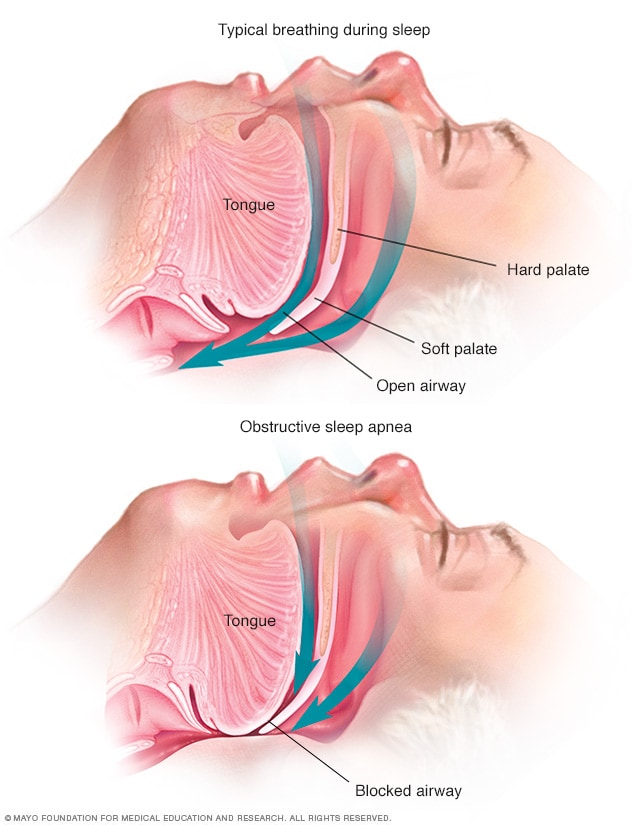Sleep is crucial for your overall health as it facilitates bodily repair, memory consolidation, and mood regulation. Adequate sleep supports immune function, hormone balance, and heart health while enhancing cognitive function and physical performance. Insufficient sleep can lead to various health issues, including weakened immune system, mood disturbances, and increased risk for chronic disease. Prioritizing 7-9 hours of quality sleep per night is essential for optimal health and well-being. If you are finding yourself suffering from sleep disturbances, keep reading to find out how we can help!
What do sleep disturbances look like?
- Snoring
- Teeth Grinding
- Observed episodes of stopped breathing
- Waking up gasping or choking
What do all of these have in common? The above are all symptoms of sleep apnea.
Sleep Apnea
What is Sleep Apnea?
Sleep apnea is a sleep disorder characterized by pauses in breathing or shallow breaths during sleep. These interruptions in breathing can occur multiple times throughout the night, leading to disrupted sleep patterns and decreased oxygen levels in the body. There are two main types: obstructive sleep apnea, caused by blockage of the airway, and central sleep apnea, caused by a problem with the brain’s signals to the muscles that control breathing. Symptoms may include loud snoring, daytime fatigue, and difficulty concentrating. Treatment options range from lifestyle changes to medical devices like continuous positive airway pressure (CPAP) machines or surgery, depending on the severity and type of sleep apnea.
Symptoms of obstructive sleep apnea:
- Excessive daytime sleepiness
- Awakening in the morning with a dry mouth or sore throat
- Morning headaches
- Trouble focusing during the day
- Mood changes, such as depression or being easily upset
- High blood pressure
- Mouth Breathing

Who can develop sleep apnea?
Sleep apnea can develop in individuals of any age. It is thought to be most common in adults, but there is growing awareness around childhood sleep apnea and the effects it has on the growing brain.
Other factors that can increase the risk of developing sleep apnea include having a thick neck circumference, being male, being older, having a family history of sleep apnea, having a small upper airway, smoking, and having certain anatomical features such as a receding chin or enlarged tonsils or adenoids.
Along with the sleep apnea symptoms listed above, there are some additional symptoms that are seen mostly in children:
- Loud snoring
- Pauses in breathing
- Learning difficulties
- Restless sleep
- Dark circles under eyes/ generally looking tired
- Behavioral problems like hyperactivity or inattention
- Growth Problems
- Bedwetting
- ADHD
- Nightmares/ Night Terrors
- Difficulty waking up in the morning
For more detail information on sleep apnea in children, please click here
Connection Between Sleep Apnea, Jaw Pain, and Muscle Pain
Sleep Apnea
When your breathing stops and starts during sleep. This can cause poor sleep quality and leave you feeling tired during the day.
TMD
(Temporomandibular Disorders)
TMD involves problems with your jaw joint (TMJ) and the muscles around it. Symptoms include jaw pain, difficulty chewing, and clicking or popping sounds when you move your jaw.
Myofacial Pain
Myofascial pain is chronic muscle pain. It involves trigger points in your muscles that cause pain in other parts of your body when pressed.
The Connection
- Teeth Grinding (Bruxism):
People with sleep apnea often grind their teeth at night. This can strain your jaw joint and muscles, leading to TMD and myofascial pain. - Interrupted Sleep:
Sleep apnea disrupts your deep sleep stages, which are important for muscle repair. Poor muscle repair can lead to chronic muscle pain. - Inflammation:
Sleep apnea can cause inflammation in your body, increasing pain sensitivity and worsening TMD and muscle pain.
What can be done to help?
Diagnosis:
It’s important to check for sleep apnea. A sleep study can help diagnose sleep apnea. Our dentists can also look for signs of teeth grinding and jaw problems.
Treatment:
Treating sleep apnea can improve both your sleep and your jaw/muscle pain. Options include CPAP therapy, which helps keep your airway open, and oral appliances that reduce strain on your jaw.
Multidisciplinary Approach:
Working with a team of specialists, including sleep doctors, dentists, and physical therapists, can provide the best care. They can offer therapies like CPAP, oral devices, Myofunctional therapy, and stress management.
Patient Education:
Understanding the link between sleep apnea and musculoskeletal pain is crucial. Following your treatment plan for sleep apnea can also reduce your jaw and muscle pain.
Addressing sleep apnea can significantly improve your overall health, reducing both sleep problems and the pain associated with TMD and myofascial pain. If you think you might have sleep apnea, TMD, or chronic muscle pain, please contact us for a comprehensive evaluation.
